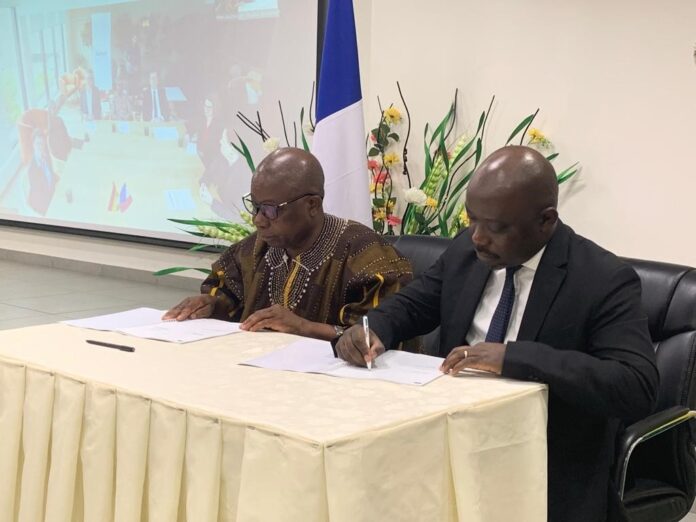
…as MoH partners Sanofi to provide comprehensive care for patients
The Ministry of Health (MoH), in collaboration with innovative global healthcare company Sanofi, has launched a diabetes-care programme to offer comprehensive and affordable diabetes treatment for patients living with the condition.
The move is part of the ministry’s commitment to promoting partnerships in diabetes prevention and control in the country.
The launch brought together stakeholders to address diabetes management gaps in Ghana and the ways forward, and also saw the signing of a memorandum of understanding (MoU) between the two partners concurrently in Accra and Paris.
The Sanofi-Ministry of Health Affordable Access to Diabetes Care Programme will enable healthcare authorities in Ghana to purchase affordable, high-quality Sanofi analogue insulin products for the management of diabetes. The three-year MoU also provides for the deployment of diabetes management solutions in four Ghanaian diabetes centres, where 500 healthcare professionals will benefit from a targetted medical training programme.
In addition, Sanofi will co-develop a digital solution to help physicians, nurses, pharmacists and community healthcare workers to better support over 5,000 people living with diabetes in Ghana, as well as provide patient-support initiatives and measures designed to help strengthen the Ghanaian health system. Diabetes-care will also be made more accessible to patients in remote areas through regional centres.
In his keynote speech at the event, Minister of Health Kwaku Agyeman-Manu described diabetes as a significant public health challenge that requires multi-sectoral action: including partnerships between government, healthcare providers, civil society organisations and the private sector.
He further indicated the partnership with Sanofi is a timely intervention that is necessary to enhance management of the disease, as diagnosed persons will have a greater chance accessing equitable, comprehensive, affordable and quality care for better outcomes.
According to him, even though National Health Insurance already covers the direct cost of care for diabetes, the extra cost required for general well-being of patients can be expensive and draining to the families’ finances; hence the need to prioritise prevention and early detection.
“There is a high financial burden on persons living with diabetes. Although the direct cost of care is covered by the NHIA, extra cost in terms of care-giving, time and nutritional support are borne by the patients, their families or care-providers through out-of-pocket payments. Due to the chronic nature of diabetes, the cost of care tends to be lifelong – further driving families and communities into poverty.

“Prioritising the prevention, early detection and management of diabetes in Ghana is crucial in reducing the morbidity and mortality of diabetes. This requires collective action and commitment from various stakeholders,” he said.
The Ghana Health Service records over 200,000 cases of diabetes annually. These numbers, the minister added, could be much higher considering the health-seeking behaviour of Ghanaians, and the limited screening opportunities available in the country.
“With this trend, diabetes is set to become one of the leading causes of death by 2030,” he projected.
Sanofi is strengthening its long-standing commitment to access to diabetes care in low- and middle-income countries, and underserved communities worldwide through a series of innovative partnerships with healthcare authorities in countries where comprehensive care has not previously been widely available. Today, the company has signed a three-year MoU with the Ministry of Health of Ghana, a milestone marked by ceremonies held simultaneously in Accra and Paris.
The Executive Vice President-General Medicines at Sanofi, Olivier Charmeil, also noted that the partnership with the Ministry of Health in Ghana goes to affirm his firm’s commitment to improving the quality of life for people living with diabetes, and is in line with the ‘affordable access’ pillar of Sanofi’s approach to corporate social responsibility (CSR).
“Our ambition to deliver better care and improve the quality-of-life for those living with diabetes knows no borders. We see this as a shared responsibility with healthcare systems, and we are committed to fully playing our part. In this context, we are proud to work closely with the Ministry of Health in Ghana, and look forward to taking the learnings from this alliance forward in other countries. More broadly, we continue to examine various healthcare access models to determine which approaches best meet specific local needs and opportunities,” Mr. Charmeil stated.
According to the International Diabetes Federation, the number of people on the continent suffering from the disease is projected to rise by 129 percent – from 24 million to 55 million by 2045.
Under-diagnosis is also widespread, with an estimated 54 percent of people living with undiagnosed diabetes. The Federation’s estimates suggest that 329,200 adults in Ghana have diabetes, the majority being Type 2; while an estimated 2,551 children and adolescents (0-19 years) are living with Type 1 diabetes.









